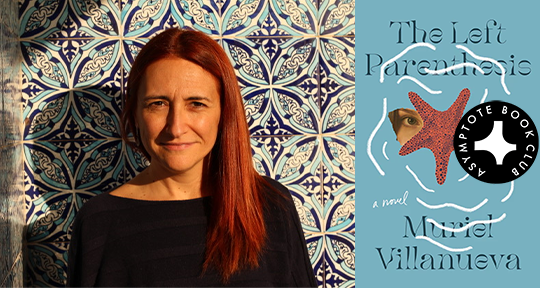In Muriel Villanueva’s poetic, undulating The Left Parenthesis, a young mother works towards repair and reinvention, threading together the disparate reflections of selfhood. Under the guise of notes on reprieve, Villaneuva delves into surreal ascriptions of consciousness, of a psychological journey that braids together experience and fantasy. In beautiful, spare language, The Left Parenthesis is an open punctuation, seeking outwards to define that which is in constant flux—life.
The Asymptote Book Club aspires to bring the best in translated fiction every month to readers around the world. You can sign up to receive next month’s selection on our website for as little as USD15 per book; once you’re a member, join our Facebook group for exclusive book club discussions and receive invitations to our members-only Zoom interviews with the author or the translator of each title.
The Left Parenthesis by Muriel Villanueva, translated from the Catalan by María Cristina Hall and Megan Berkobien, Open Letter, 2022
I knew you weren’t well, but I pretended it wasn’t true, because the whole thing made me sick, too. If you died, so did I. If we were a pair, what would that make me afterward?
What do you do when you define yourself by your relationship to another person, and that person ceases to exist? How do you go about allowing the self that you have become to crumble away, making room for a new self to grow? Muriel Villanueva’s The Left Parenthesis—a slim, surreal novella tracking a woman’s trip with her young baby to a small beach town—examines precisely such questions in sparing, direct prose.
The narrative follows the inner life of a woman seeking to understand herself. Throughout the novella, the protagonist, also named Muriel, unpacks and dissects her three selves: the self that is a mother to her daughter Mar, her wife-self (she tells us at the start that she is a widow), and the self that acts as a mother to her own husband. She grapples with the fact that she was never sure which of her selves would emerge when she opened her mouth, a response to her husband’s oscillation between his child-self (the one she felt compelled to mother) and his burgeoning man-self. This three-week excursion, a brief parenthetical phrase within the novel that is her life, is something she undertakes to hopefully catalyse a transformation within her, a process of purging and healing.
Threaded through this book is the eponymous theme of an opening parenthesis, an explanatory and exploratory phase of existence that is separate—parallel—to the day-to-day. “At the beginning of my stay here I thought the cove with the shape of a waning moon. Now I think it’s only a parenthesis. It opens over here and I don’t know where it closes.” The cove to which the protagonist retreats is curved like a parenthesis, simultaneously opening out and welcoming in. This symbolic shape is mirrored in the curve of her arm as she breastfeeds her infant daughter, nurturing her baby as she herself is being nurtured by this trip, this secluded spot to which she has retreated. READ MORE…



